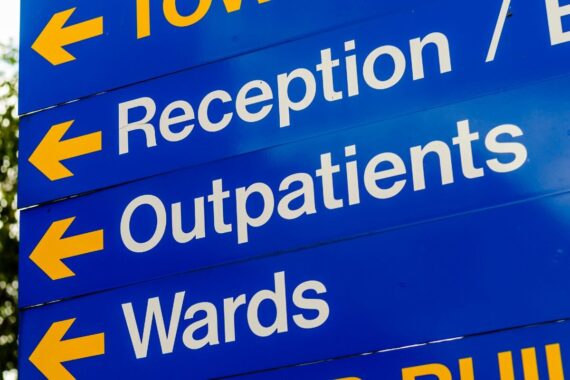GPs should be paid to keep people out of hospital, says new Government adviser

GPs should be given funding to keep people out of hospital in a new financial system that creates ‘savings’ for acute trusts, according to health secretary Wes Streeting’s new adviser.
Paul Corrigan, a Blair-era health adviser, has been appointed by the Department of Health and Social Care (DHSC) to support a new 10-year strategy, which will be based on Professor Lord Ara Darzi’s investigation into the ‘state of the NHS’.
Speaking on a recent NHS Confederation podcast, just a day before his DHSC appointment, Mr Corrigan said ‘integration’ of different parts of the NHS is failing because the current financial structure ‘fragments’ the system.
He argued for ‘innovation’ in how finance streams are set up between GPs, hospitals, and other parts of the system, and that a new funding structure is necessary to achieve integration and improve acute care.
‘We need to have some innovation about how we work the money through the system, so that, for example, the extra money that goes into either primary care or domiciliary care to keep frail, older people out of hospital, is in some way paid back by the savings that are made in that entirely different stream in emergency care and the hospital,’ Mr Corrigan said.
DHSC’s new strategic adviser also claimed it is not ‘feasible’ to increase NHS funding when there is no corresponding increase in productivity – although he pointed out that this is not the case for primary care.
According to Mr Corrigan, there is a ‘lot of evidence’ that acute trusts have had a 20% increase in doctors and nurses in four years, but no increase in productivity.
He said: ‘I can understand people saying that there needs to be more money. But the money that’s there – and I’m talking very specifically to trusts there, because the same amount of increased money has not gone into primary care – but the money that’s there, when people say “we’ve had a 20% increase in doctors and nurses and we need more money” – I just think it’s not feasible.’
Mr Corrigan, who developed the policy for foundation trusts during his time as a health adviser, admitted that ‘reorganisations’ he was involved in ‘didn’t achieve very much’ and actually ‘destabilised’ NHS staff.
He will work alongside Sally Warren, who has left her position as policy director at the King’s Fund think tank, to develop the new Government’s 10-year plan to reform the NHS.
A DHSC spokesperson said: ‘We welcome the wealth of expertise Professor Paul Corrigan brings to his new role and together we look forward to building an NHS that is fit for the future.’
In another Blair-era appointment, the health secretary has also brought back Alan Milburn, who spearheaded increased private involvement in the NHS, to support with reform.
Following Mr Streeting’s appointment, the BMA’s GP Committee urged him to ‘stop disinvestment’ in general practice and increase its proportion of NHS funding by 1% year on year.
But the GPC later warned the health secretary that boosting general practice funding must not come at the expense of hospitals.
In his first official visit in the role – to a GP practice in London – Mr Streeting announced he is ‘committed to reversing’ the underfunding of general practice.
Pulse July survey
Take our July 2025 survey to potentially win £1.000 worth of tokens

Related Articles
READERS' COMMENTS [8]
Please note, only GPs are permitted to add comments to articles











Corrigan’s appointment continues the bad signalling by the new Govt. His worship of manipulation of internal markets (in the public sector!! productivity!! no more funding!! ) is a classic neoliberal play, and introduces more obfuscation into primary care.
His output is classic rent-seeking behaviour.
Better get ready for robust IA if you still want decent GP services, for when you retire and for the next generation.
Another iteration of referral/admission prevention and early discharge strategies. As if all of this hasn’t been happening for twenty years or more, in various guises. Another wheel about to be reinvented. Chances are core funding will be top sliced so it can be “earned” back. All too familiar.
Stop chucking money at problems without prior insight you useless sacks of spuds.
I remember in Blairs days when community nurse mumbers were boosted to keep patients out of hospital. The community nurse told me she had to document every prescription of an antibiotic as a “SAVE” as this must have saved a hospital admission and therefore justified /fulfilled her contract of employment withnthe Trust.
It was at the expense of increased antibiotic prescribing.
Is this what we are returning to?
How will we measure a SAVE, against risk of death, disability and discomfort.
From my point as a GP, the main issue seems to be grossly inappropriate early discharges from surgical but also medical wards.
Shame because I fill my day admitting completely well people to hospital.
Tried it before.
Failed before.
Here we go again.
Darzi, Milburn, admission avoidance schemes, what next to be dredged from the past?
Labour talked big before the election but it’s more clear than ever they are utterly clueless.
Everything to save the poor old hospitals. Doubling in consultant numbers in 20 years. Legions of highly specialist expert extended scope nurse consultant practitioners. What do they do all day??
Yes yes yes man